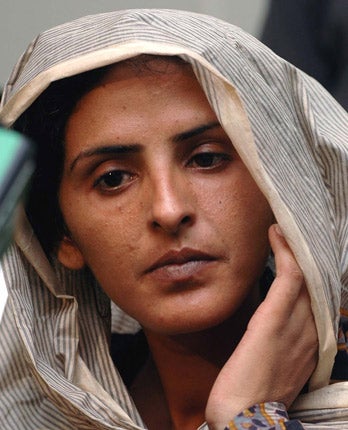Acquittals leave rape victim in fear for her life

A Pakistani woman who became the focus of international outcry when she was gang-raped at the orders of a village council yesterday said she feared for her safety after a ruling by the country's highest court left just one of the men accused of attacking her behind bars.
Mukhtar Mai was an illiterate young woman when she was raped in 2002 on the orders of a village council who deemed it a suitable punishment after her younger brother, aged just 12, was alleged to have insulted the honour of a rival tribe by having an affair with one of its female members.
Rather than quietly accepting the punishment as tradition demanded, Ms Mai spoke out against the attack on her and her case triggered widespread outrage. She insisted on pursuing the case through the courts, where it emerged her brother had been molested by three tribesmen and that the allegation against him had been part of an attempted cover-up. A court subsequently convicted six of a total of 14 men she had accused and sentenced them to death. The others were acquitted.
Amid the unprecedented publicity her case received, Ms Mai became a totem of the women's rights movement, both in Pakistan and beyond. She was able to set up several schools close to her native village, Meerwala, in Punjab province, to help educate young women.
Those men found guilty of attacking her appealed to the Lahore High Court which later overturned five of the six convictions and commuted the death sentence of the one man whose conviction it upheld, Abdul Khaliq. Ms Mai announced in 2005 she would take her case to the Supreme Court and seek to have all 14 men convicted.
But yesterday, six years later, Ms Mai learned that a three-member bench of the court had rejected her appeal. Reacting on Twitter soon after the judgment, she wrote: "Supreme court's verdict proves that police dictate justice system in Pakistan... No court can weaken my resolve to stand against injustice."
Later Ms Mai vowed her work with schools would continue, and she would not leave the country, but said the ruling had made her fear for her safety. Speaking from her village she told The Independent: "I'm really disappointed. If they wanted to uphold the lower court's decision, why did they humiliate me for the past five years?" She added: "When these people come back to my village, my family and myself will be under threat. I will be staying in Pakistan, in my village, but if I am hurt in any way the government and the Supreme Court will be responsible."
Campaigners and activists denounced the court's decision. Human Rights Watch voiced dismay, saying the attack on Ms Mai was a "crime that took place in full public view and the perpetrators were publicly identified". "Today's verdict case reflects poorly on the Supreme Court and underscores the reality that while Pakistan's judiciary is now independent, it retains a deeply embedded bias against women in particular and on rights issues in general" said spokesman, Ali Dayan Hasan. "This is a setback for Mukhtar Mai, the struggle to end violence against women and the cause of an independent, rights-respecting judiciary in Pakistan."
Tahira Noor, of the National Commission on the Status of Women, said the judgment had shaken the confidence of women in the country to stand up for their rights. "The outcome... discourages survivors of rape and gang rape to report," she added. "However, we are proud of Mukhtar Mai, who stood bravely against all intimidation and harassment and has refused to buckle under life threats. She has given a message of courage and hope to all women victims of our country."
Ayesha Tammy Haq, a writer and social commentator, said: "This judgment is depressing. It shows up the terrible problems women face with the criminal justice system, where police do not record evidence and rapists go free as a result."
Join our commenting forum
Join thought-provoking conversations, follow other Independent readers and see their replies
Comments